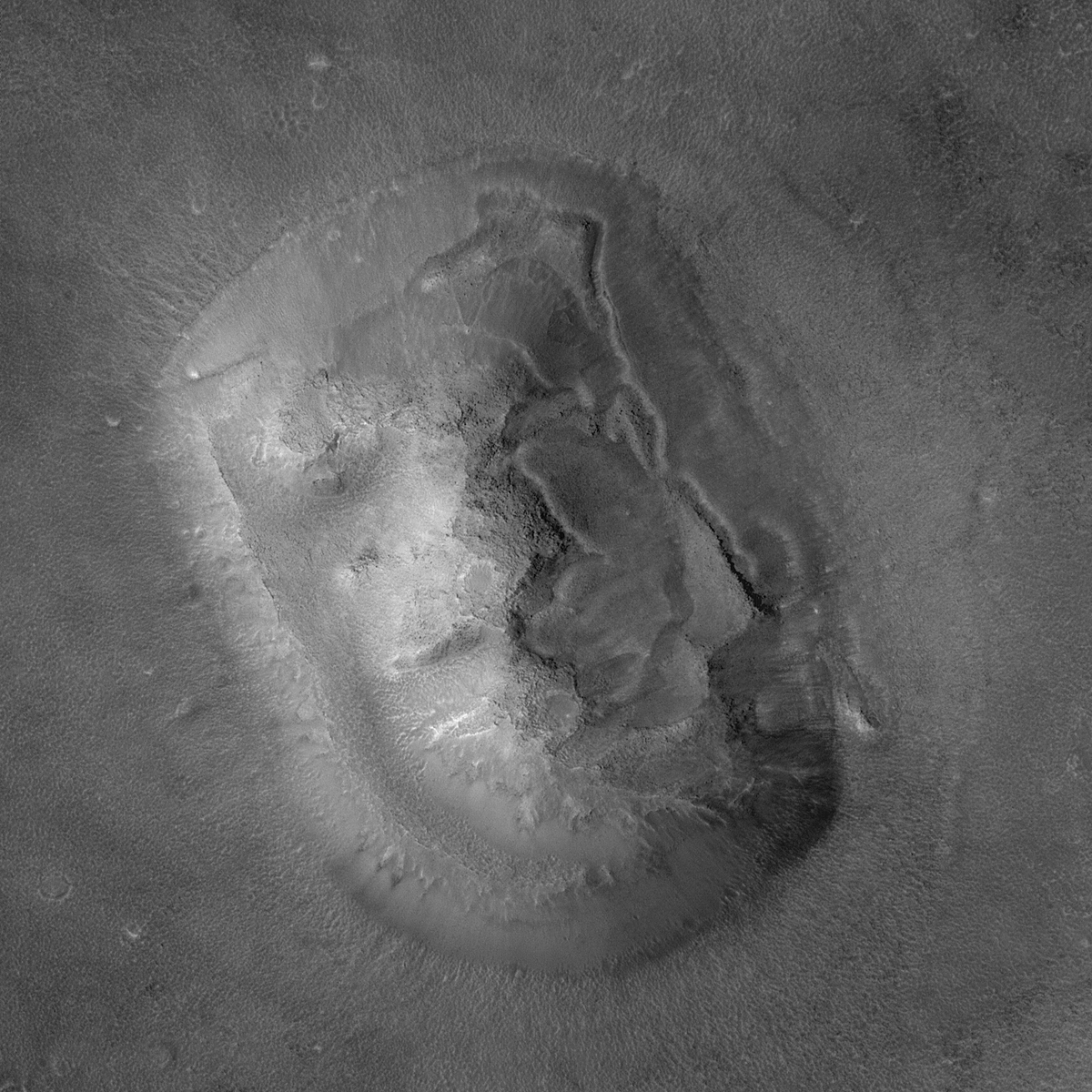Page 1 of 2
APOD: Moonquakes Surprisingly Common (2010 Oct 10)
Posted: Sun Oct 10, 2010 3:59 am
by APOD Robot
 Moonquakes Surprisingly Common
Explanation:
Moonquakes Surprisingly Common
Explanation: Why are there so many moonquakes? A recent reanalysis of
seismometers left on the moon by the
Apollo moon
landings has revealed a surprising number of moonquakes occurring within 30 kilometers of the surface. In fact, 28
moonquakes were detected in data recorded between 1972 and 1977.
These moonquakes were not only strong enough to move
furniture but the stiff rock of the moon continued vibrating for many minutes, significantly longer than the soft rock Pictured above in 1969, Apollo 11 astronaut
Buzz Aldrin stands besides a recently deployed
lunar seismometer, looking back toward the
lunar landing module.
[/b]
Re: APOD: Moonquakes Surprisingly Common (2010 Oct 10)
Posted: Sun Oct 10, 2010 4:54 am
by JuanAustin
just curious, what time is it on the moon?
that is to say, are there time zones up there or will there be?
Re: APOD: Moonquakes Surprisingly Common (2010 Oct 10)
Posted: Sun Oct 10, 2010 4:59 am
by geckzilla
Juan, nobody lives on the moon so nobody uses the moon as a frame of reference for time telling. If one were to live on the moon and adopt a moon-based time system, it would have to be radically different from Earth's because the moon takes so much longer to make one rotation on its axis... that is to say that here on Earth every day takes about 24 hours but on the moon it takes a little over 27 earth days...
Re: APOD: Moonquakes Surprisingly Common (2010 Oct 10)
Posted: Sun Oct 10, 2010 5:03 am
by Chris Peterson
JuanAustin wrote:just curious, what time is it on the moon?
that is to say, are there time zones up there or will there be?
I don't think there is any standard for time on the Moon. Logically, any location has a local time which would could be defined in terms of its position within the approximately 27 Earth-day lunar day. Researchers with probes or instruments on or around the Moon probably use Earth time, either local to the researcher or UT.
I doubt there would ever be time zones. They really only make sense on bodies with rotation periods similar to the Earth. On the Moon, work and sleep cycles would be completely disconnected from the lunar day, so the most practical solution would be to just use the same time everywhere, and that would almost certainly be UT or some other Earth-based reference.
Re: APOD: Moonquakes Surprisingly Common (2010 Oct 10)
Posted: Sun Oct 10, 2010 5:08 am
by geckzilla
That kind of cycle wouldn't be very good for one's circadian rhythm. Being stuck for 324 hours at a time with constant light or dark... perhaps ask some penguins for advice.
Re: APOD: Moonquakes Surprisingly Common (2010 Oct 10)
Posted: Sun Oct 10, 2010 5:16 am
by Chris Peterson
geckzilla wrote:That kind of cycle wouldn't be very good for one's circadian rhythm. Being stuck for 324 hours at a time with constant light or dark... perhaps ask some penguins for advice.
Well, I think it's a safe assumption that people will be indoors for most of that time, so I guess they would run the artificial lighting with a 24-hour clock. (Actually, the average circadian cycle for humans is longer than 24 hours, and it would make sense to adopt that if there were no need to stay synchronized with Earth- like on a generation ship.)
Re: APOD: Moonquakes Surprisingly Common (2010 Oct 10)
Posted: Sun Oct 10, 2010 5:20 am
by geckzilla
Of course, Chris, of course.

They could use some of this technology in Sweden and other northerly places. Actually, something about it still makes me wonder just how it would affect a human body. It would seem the night cycle would be particularly difficult because there would be no option for natural sunlight. Artificial lighting doesn't quite have the same positive effect on one's emotional status as the sun. Vitamin D supplements, anyone?
Re: APOD: Moonquakes Surprisingly Common (2010 Oct 10)
Posted: Sun Oct 10, 2010 5:29 am
by Chris Peterson
geckzilla wrote:Of course, Chris, of course. :) They could use some of this technology in Sweden and other northerly places. Actually, something about it still makes me wonder just how it would affect a human body. It would seem the night cycle would be particularly difficult because there would be no option for natural sunlight. Artificial lighting doesn't quite have the same positive effect on one's emotional status as the sun. Vitamin D supplements, anyone?
They do use technology to treat
seasonal affective disorder in people at high latitudes. The lamps used seem to do the same job as natural sunlight. Similar methods are also used with scientists wintering over in Antarctica, and probably with others in similar situations. I guess it would probably be a pretty minor issue compared to other medical concerns living on the Moon (like bone mass loss, for instance).
Re: APOD: Moonquakes Surprisingly Common (2010 Oct 10)
Posted: Sun Oct 10, 2010 6:35 am
by Yoric
I want to believe the US landed on the moon, but in this photo, Buzz Aldrin, Apollo 11, it is completely impossible for nature to draw the shadow of a straight line across someone's leg.
Re: APOD: Moonquakes Surprisingly Common (2010 Oct 10)
Posted: Sun Oct 10, 2010 6:55 am
by owlice
Oh, I love this! And one never knows what one is going to find in APOD text, such as a timeline of furniture!


Re: APOD: Moonquakes Surprisingly Common (2010 Oct 10)
Posted: Sun Oct 10, 2010 6:57 am
by jefffstone
I would guess that moonquakes are caused by tidal forces exerted by the Earth on the moon. Actually, now that I've looked at wikipedia, whoever wrote the article seems to agree, citing a phenomenon called libration.
Re: APOD: Moonquakes Surprisingly Common (2010 Oct 10)
Posted: Sun Oct 10, 2010 7:22 am
by mexhunter
I also think this, as it is the most logical. But aside from Wikipedia, I find no relevant information. I will have to intensify the search.
The picture is very good. These photos always evoke memories of the event.
Greetings
César
Re: APOD: Moonquakes Surprisingly Common (2010 Oct 10)
Posted: Sun Oct 10, 2010 9:13 am
by fatflash
41 year old photo is the best you all can do?????
Re: APOD: Moonquakes Surprisingly Common (2010 Oct 10)
Posted: Sun Oct 10, 2010 9:25 am
by Ann
Yoric wrote:I want to believe the US landed on the moon, but in this photo, Buzz Aldrin, Apollo 11, it is completely impossible for nature to draw the shadow of a straight line across someone's leg.
There is no shadow of a straight line on Buzz Aldrin's leg. That's a grid mark. You can see that those grid marks extend all over the picture to the right, evenly spaced. There is a second row of grid marks below the top one. There is an upper row of grid marks too, but you can't see them against the blackness of space. One is visible against the Moon lander, though.
Grid marks were common in early astronomy imagery. You can see rows of evenly spaced large black dots running diagonally across the infamous "face on Mars" image from 1976:
In a much later image of "the Face on Mars", revealing it not to be a face, there are no grid marks, since they are hardly ever seen in modern astrophotography:
You can be sure that US astronauts landed on the Moon, Yoric. Going to the Moon is very, very hard, very, very expensive and very, very risky. But it is in no way impossible. The Moon is ridiculously close to the Earth, after all, compared with all other objects in space apart from odd asteroids and meteors zipping by. The United States met the costs of sending astronauts to the Moon by making the average American taxpayer shell out incredible amounts of money that went straight into the American moon landing project, the Apollo. As for the risks, Apollo 13 failed and the three astronauts aboard could so easily have been killed, but they were saved through a combination of luck and skill.
Why was the moon landing project abandoned? Why are there no bases on the Moon today, 41 years after the first Moon landing?
Easy. The Moon landing project was never really about exploring the Moon or doing honest lunar astronomy. It was a prestige project that was, ultimately, about beating the Soviet Union and showing them who was top dog in space. Once the United States had won the space race over the Soviet Union the American government people lost interest in the Moon, because the Moon is, frankly, a rather boring place. And sending astronauts there is, as I said, incredibly costly and risky, and the American tax payers may not have wanted to finance a further exploration of the Moon, let alone a "colonisation" of the Moon in the form of establishing bases there.
Ann
Re: APOD: Moonquakes Surprisingly Common (2010 Oct 10)
Posted: Sun Oct 10, 2010 10:05 am
by Giordano Bruno
Thank you APOD to show every day the magestic beauty of the Universe.
Moon Walking is subjet to a lot of questionning .
Did we go ???
My answer is " NOT " Astro-not
Von Braun and Nixon fooled the world
Our honor is to be able to look by ourselves and dare to make up our mind indepedently from mass opinion
Enjoy your day and your research
Re: APOD: Moonquakes Surprisingly Common (2010 Oct 10)
Posted: Sun Oct 10, 2010 10:12 am
by Ann
Giordano Bruno wrote:Thank you APOD to show every day the magestic beauty of the Universe.
Moon Walking is subjet to a lot of questionning .
Did we go ???
My answer is " NOT " Astro-not
Von Braun and Nixon fooled the world
Our honor is to be able to look by ourselves and dare to make up our mind indepedently from mass opinion
Enjoy your day and your research
What exactly do you base your opinion on, Giordano Bruno?
Ann
Re: APOD: Moonquakes Surprisingly Common (2010 Oct 10)
Posted: Sun Oct 10, 2010 10:16 am
by owlice
Ann wrote:
What exactly do you base your opinion on, Giordano Bruno?
Ann
Doesn't matter, Ann; this is not a board for alternative theories. There are other places on the web to discuss them; this is not one of them, as the rules clearly state:
Alternative Theories and Conspiracy Theories
This board concentrates on the mainstream or consensus view of cosmology. Alternative theories and conspiracy theories are not discussed here. We may decide to allow limited discussion of these at some later date. For now, however, we ask that you take these discussions to other boards that allow such discussions, such as The BAUT Forum.
The idea of the moon landing being a hoax falls under conspiracy theories. People believe a lot of silly things; I, for one, often believe I'm Superwoman and that I can get a lot of things done in much less time than it actually takes to do them. Some people believe humans never walked on the moon. Those who wish to believe that are welcome to, and they are welcome to discuss that elsewhere. Asterisk is not the place for these discussions.
Re: APOD: Moonquakes Surprisingly Common (2010 Oct 10)
Posted: Sun Oct 10, 2010 10:30 am
by owlice
mexhunter wrote:These photos always evoke memories of the event.
Only for those of us old enough to remember the event!

Re: APOD: Moonquakes Surprisingly Common (2010 Oct 10)
Posted: Sun Oct 10, 2010 11:02 am
by Ann
So you are allowed to
state your belief in alternative theories (there was no Moon landing, we are regularly visited by ET, the Earth is flat, the greatest threat to the survival of humanity is the evil killer tomatoes from Epsilon Eridani b etecera) - but you are not allowed to explain
why you believe in these alternative theories?
Okay, Owlice. Just so I know.
By the way, I don't believe in the Moon landing because I firmly believe that the Moon is made of cheese, and its surface is too spongy to take the blasts from the Moon lander during the landing phase. (Oh, wait, I was not allowed to say that - so I'll just say that I don't believe in the Moon landing because I know that the Moon is made of cheese!)

Ann
Re: APOD: Moonquakes Surprisingly Common (2010 Oct 10)
Posted: Sun Oct 10, 2010 12:06 pm
by orin stepanek
Re: APOD: Moonquakes Surprisingly Common (2010 Oct 10)
Posted: Sun Oct 10, 2010 1:01 pm
by kjmerz
It was actually called the Lunar Excursion Module (LEM), not the Lunar Landing Module...
Re: APOD: Moonquakes Surprisingly Common (2010 Oct 10)
Posted: Sun Oct 10, 2010 1:47 pm
by Tiago
Maybe the moonquakes are related someway to the effect of gravity and tidal waves that could affect the moon's surface. Just like what occours in the jupiter's moons but in a much smaller scale, obvious.
Re: APOD: Moonquakes Surprisingly Common (2010 Oct 10)
Posted: Sun Oct 10, 2010 2:10 pm
by biddie67
I wonder if any of the astronauts that walked the Moon ever mentioned feeling a moonquake .... it's interesting to me that of all the possible types of instrumentation that could have been left behind for monitering the environment, a seismometer was one of the ones left there.
Even though it was back in the late 60's, wasn't there other types of instruments available for monitoring and measuring other types of solar system characteristics?
Now, with all the extra skills and equipment, It seems that the back side of the Moon, being free of Earth's atmosphere would make it an ideal place to place all kinds of instruments - especially with the possibility of having a satellite placed at the L2 point in the Earth-Moon system ((I just read about that as I followed links from today's APOD)) to transmit info back to Earth.
Re: APOD: Moonquakes Surprisingly Common (2010 Oct 10)
Posted: Sun Oct 10, 2010 2:34 pm
by rstevenson
Yoric wrote:I want to believe the US landed on the moon, but in this photo, Buzz Aldrin, Apollo 11, it is completely impossible for nature to draw the shadow of a straight line across someone's leg.
If you are referring to the shadow across Buzz's right foot, that is just a coincidence of alignment. If the camera were a little higher or lower, you'd see the shadow curve around the leg.
You can easily set up an experiment to show yourself this effect. Then you can come back and say Oops!
Rob
Re: APOD: Moonquakes Surprisingly Common (2010 Oct 10)
Posted: Sun Oct 10, 2010 3:31 pm
by Chris Peterson
Ann wrote:There is no shadow of a straight line on Buzz Aldrin's leg. That's a grid mark. You can see that those grid marks extend all over the picture to the right, evenly spaced. There is a second row of grid marks below the top one. There is an upper row of grid marks too, but you can't see them against the blackness of space. One is visible against the Moon lander, though.
Grid marks were common in early astronomy imagery...
In a much later image of "the Face on Mars", revealing it not to be a face, there are no grid marks, since they are hardly ever seen in modern astrophotography...
I think he is talking about the shadow cast by the adjacent solar panel. Of course, he's wrong that you can't get a natural shadow that looks straight on a curved object.
The subject of the grid marks is very interesting, though. Those of us old enough to remember early space photography, or who enjoy historical images, recall seeing them all the time. They are called
fiducials and are produced by
reticles, lines etched on glass plates called
reseau plates. They were used with film, because film is dimensionally unstable- it can stretch a bit. By pressing the film against the reseau plate for reference, much more accurate dimensional data could be taken from the images.
You don't see these used anymore because we don't use film anymore. CCDs and most other electronic sensors are inherently stable dimensionally, and are pixel based (an exception is scanned tube images, and cameras with those sensors- now obsolete- normally included reticles). When you work with a CCD image, you know exactly where each pixel is, so you don't need an external reference.
Film has many problems that CCD detectors largely avoid. Besides the mechanical instability, it has a very non-linear response, its resolution varies with contrast, and light scatters in the emulsion layer. Because of these effects, the fiducials can look very strange sometimes- I've seen them (or parts of them) inverted, invisible, or appearing to be behind objects in the image. All of these things are pretty easy to understand, but provide material for conspiracy nuts who claim the images are faked (although why somebody faking images would make such obvious "mistakes" is never explained).
 Moonquakes Surprisingly Common
Moonquakes Surprisingly Common

